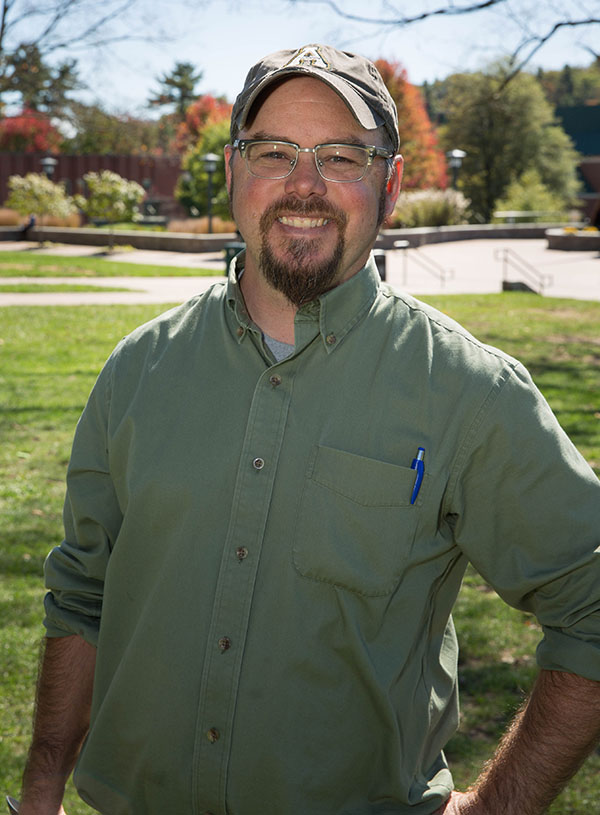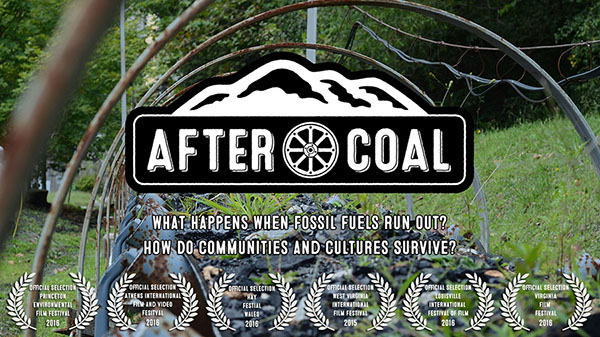BOONE, N.C. — When fossil fuels run out, how do communities whose livelihoods depend on these resources survive? What happens to their cultures?
“After Coal,” a feature-length documentary produced by Appalachian State University’s Thomas Hansell, explores how coal-mining communities in South Wales and Appalachia have survived long after the coal industry has moved on. The book adaptation of the film, “After Coal: Stories of Survival in Appalachia and Wales,” will be released by West Virginia University Press in November.
Hansell is assistant professor in Appalachian’s Appalachian studies program, which is housed within the university’s College of Arts and Sciences, as well as co-director of Appalachian’s University Documentary Film Services, a unit of Appalachian's University College. He also teaches courses within Appalachian’s Honors College.
“After Coal” was released in 2016 and has already been screened at many international and domestic film festivals, as well as on public television.
“Many documentary films focus on the problems left by a declining coal industry in the Appalachian region instead of discussing how solutions from global coal-mining regions can inspire sustainable community development,” Hansell said.
Hansell presented “After Coal” on two continents in spring 2018. In February, he traveled to Japan to screen the documentary at conferences hosted by Osaka University and Japan Women’s University, and discussed the effects of deindustrialization on global communities.
In March, “After Coal” was screened at a conference titled “Boom, Crisis, Heritage: King Coal and the Energy Revolutions after 1945,” which was hosted by the Deutsches Bergbau-Museum in Bochum, Germany. The film also screened at the Dortmunder U cinema in Dortmund, Germany.
“Because of a willingness to explore the complex connections between place, culture, work and industry that seemed similar in Wales and Appalachia, the Center for Appalachian Studies has built relationships for the past 40 years that offer international contexts for better understanding Appalachia,” said Sandra Ballard, editor of the university’s Appalachian Journal: A Regional Studies Review.
“This American region becomes ‘global’ because of an exchange of information between two mountain regions on different continents,” she added.
“After Coal: Stories of Survival in Appalachia and Wales” is available for preorder from the West Virginia University Press website.
About Thomas Hansell
Hansell is an award-winning filmmaker and installation artist who lives and works in the Appalachian Mountains. His documentary films have been broadcast nationally on public television and have screened at international film festivals. His sculpture and installations have appeared in galleries from California to Vermont.
Hansell’s documentaries include “The Electric Fairy,” “Juice” and “Coal Bucket Outlaw,” which were produced with the Appalshop media, arts and education center in Whitesburg, Kentucky. He has 20 years of experience at Appalshop, having worked with students and others to create media about their communities.
He has taught community media workshops throughout the U.S., as well as in China and Indonesia. He is the recipient of grants and fellowships from the Kentucky Arts Council, the Headlands Center for the Arts, the Southern Humanities Media Fund and the National Endowment for the Arts.
Hansell holds a Master of Fine Arts in interdisciplinary arts from Goddard College and a Bachelor of Science in communication from Ohio University. His research includes relevant interviews and stories of sustainability that offer strategies and hope for communities that are struggling with change.
The film embodies three characteristics of Appalachian State University’s culture: sustainability, global learning and community engagement
About AppDocs
AppDocs at Appalachian State University supports documentary work grounded in collaborative local and global partnerships. Photography, film/video, audio and writing are used to capture and convey memory, life, research, theory and culture. Additionally, the program provides professional consultation to students, faculty and staff engaged in documentary projects; coordinates documentary workshops; and sponsors screenings of documentaries produced by App State faculty, staff and visiting filmmakers. AppDocs partners with the Appalachian Theater of the High Country to produce the annual Boone Docs Film Festival. Learn more at https://doc.appstate.edu.
About University College
Formed in 2007, University College consists of the university’s general education program, faculty and student support, and co-curricular programming and support – all designed to support the work of students both inside and outside the classroom. All students at Appalachian begin their education in University College and benefit from its programs until they graduate. Learn more at https://universitycollege.appstate.edu.
About the Center for Appalachian Studies
The Center for Appalachian Studies promotes public programs, community collaboration, civic engagement and scholarship on the Appalachian region. The center is committed to building healthy communities and deepening knowledge of Appalachia’s past, present and future through community-based research and engagement. Learn more at https://appcenter.appstate.edu.
About the College of Arts and Sciences
The College of Arts and Sciences (CAS) at Appalachian State University is home to 17 academic departments, two centers and one residential college. These units span the humanities and the social, mathematical and natural sciences. CAS aims to develop a distinctive identity built upon our university's strengths, traditions and locations. The college’s values lie not only in service to the university and local community, but through inspiring, training, educating and sustaining the development of its students as global citizens. More than 6,800 student majors are enrolled in the college. As the college is also largely responsible for implementing App State’s general education curriculum, it is heavily involved in the education of all students at the university, including those pursuing majors in other colleges. Learn more at https://cas.appstate.edu.
About Appalachian State University
As a premier public institution, Appalachian State University prepares students to lead purposeful lives. App State is one of 17 campuses in the University of North Carolina System, with a national reputation for innovative teaching and opening access to a high-quality, cost-effective education. The university enrolls more than 21,000 students, has a low student-to-faculty ratio and offers more than 150 undergraduate and 80 graduate majors at its Boone and Hickory campuses and through App State Online. Learn more at https://www.appstate.edu.
What do you think?
Share your feedback on this story.









![How NCInnovation Is Rethinking Economic Development in North Carolina [faculty featured]](/_images/_posts/2026/02/rethinking-economic-development-600x400.jpg)






